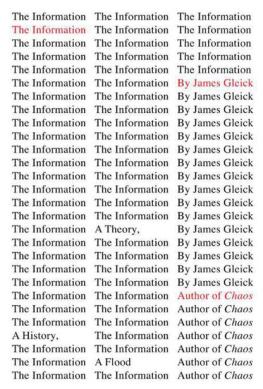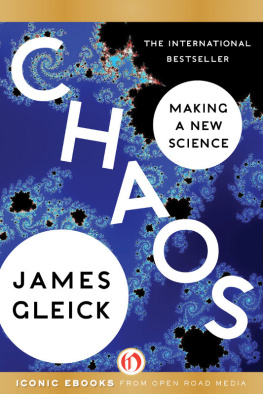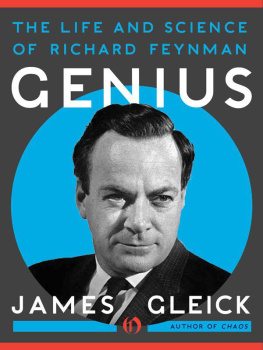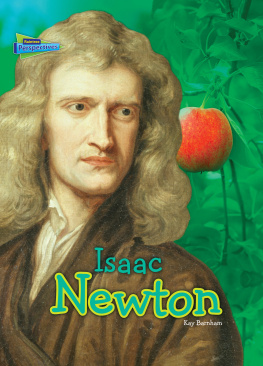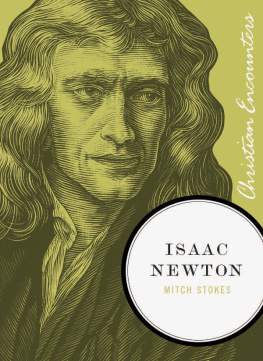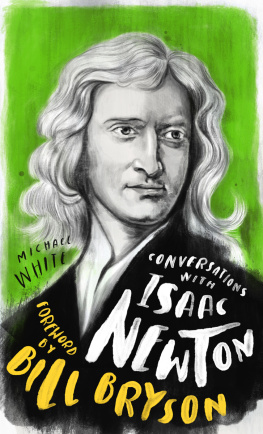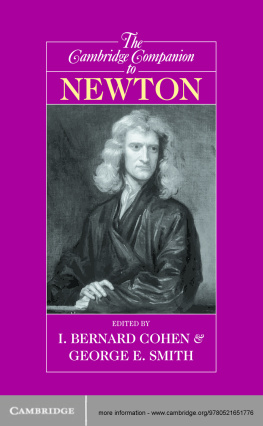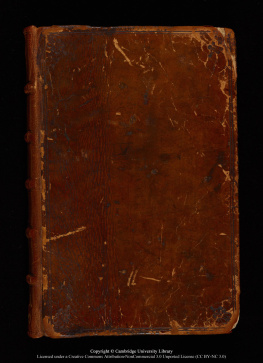Acknowledgments and Sources
I have meant to ground this book as wholly as possible in its time; in the texts. The diaspora of Newtons manuscripts began at his death, continued for more than three centuries, and has only lately been reversed. They are still widely scattered, but the Cambridge University Libraries have gathered much of the essential core holding, including much of Newtons own library, annotated by him. I am indebted to Adam J. Perkins and others for great courtesy. Documents are cited according to the Cambridge numbering scheme as Add MS (Additional Manuscripts) or Keynes MS (Keynes Collection at Kings College). I am grateful to Joanna Corden, Rafael Weiser, Silvie Merian, and their colleagues in the archives of the Royal Society of London, the Jewish National and University Library in Jerusalem (Yehuda MS), and the Pierpont Morgan Library in New York, and to the National Trust custodians at Woolsthorpe Manor, for access and knowledge.
For guidance, criticism, and correction, I owe special thanks to James Atlas, Cynthia Crossen, Peter Galison, Scott Mandelbrote, Esther Schor, Craig Townsend, and Jonathan Weiner, as well as my agent, Michael Carlisle. Above all to my editor, Dan Frank.
PUBLISHED WORKS OF NEWTON
There is no such thing as The Collected Works of Isaac Newton. The Newton Project, at Imperial College, London, has long-term plans for the theological, alchemical, and Mint writings. Meanwhile two monuments of scholarship are the collected correspondence and the collected mathematical papers:
Turnbull, Herbert W.; Scott, John F.; Hall, A. Rupert; and Tilling, Laura, eds. The Correspondence of Isaac Newton (cited as Corres). Seven volumes. Cambridge: Cambridge University Press, 195977.
Whiteside, D. T., ed. The Mathematical Papers of Isaac Newton (cited as Math). Eight volumes. Cambridge: Cambridge University Press, 196780.
Optical papers are in progress:
Shapiro, Alan E., ed. The Optical Papers of Isaac Newton: The Optical Lectures 16701672. Cambridge: Cambridge University Press, 1984.
I have depended on other essential texts collected or reproduced in these volumes:
Principia:
The Principia: Mathematical Principles of Natural Philosophy (cited as Principia). Translated by I. Bernard Cohen and Anne Whitman with the assistance of Julia Budenz. Berkeley: University of California Press, 1999.
Sir Isaac Newtons Mathematical Principles of Natural Philosophy and His System of the World. Translated by Andrew Motte (1729), revised by Florian Cajori. Berkeley: University of California Press, 1947.
Newtons Principia: The Central Argument: Translation, Notes, and Expanded Proofs. Dana Densmore and William H. Donahue. Santa Fe: Green Lion Press, 1995.
Opticks. Foreword by Albert Einstein. New York: Dover, 1952.
The Background to Newtons Principia: A Study of Newtons Dynamical Researches in the Years 16641684. John Herivel. Oxford: Oxford University Press, 1965.
Certain Philosophical Questions: Newtons Trinity Notebook. J. E. McGuire and Martin Tamny. Cambridge: Cambridge University Press, 1983.
Isaac Newtons Papers & Letters on Natural Philosophy. Edited by I. Bernard Cohen. Cambridge, Mass.: Harvard University Press, 1958.
The Janus Faces of Genius: The Role of Alchemy in Newtons Thought. Betty Jo Teeter Dobbs. Cambridge: Cambridge University Press, 1991.
Newton: Texts, Backgrounds, Commentaries. Edited by I. Bernard Cohen and Richard S. Westfall. New York: Norton, 1995.
The Preliminary Manuscripts for Isaac Newtons 1687 Principia, 168485. Introduction by D. T. Whiteside. Cambridge: Cambridge University Press, 1989.
The Unpublished First Version of Isaac Newtons Cambridge Lectures on Optics, 16701672. Introduction by D. T. Whiteside. Cambridge: University Library, 1973.
Unpublished Scientific Papers of Isaac Newton. Edited by A. Rupert Hall and Marie Boas Hall. Cambridge: Cambridge University Press, 1962.
OTHER PRIMARY AND SECONDARY SOURCES
The authoritative scientific biography is Richard S. Westfalls Never at Rest (Cambridge: Cambridge University Press, 1980). He offered a salutary warning to all who follow: The more I have studied him, the more Newton has receded from me. Only another Newton could hope fully to enter into his being, and the economy of the human enterprise is such that a second Newton would not devote himself to the biography of the first.
Adair, John. By the Sword Divided: Eyewitness Accounts of the English Civil War. Bridgend, U.K.: Sutton, 1998.
Alexander, Henry Gavin, ed. The Leibniz-Clarke Correspondence. Manchester: Manchester University Press, 1956.
Algarotti, Francesco. Sir Isaac Newtons Philosophy Explaind Forthe Use of the Ladies. In Six Dialogues on Light and Colours. London: E. Cave, 1739.
Andrade, Edward Neville da Costa. Newtons Early Notebook. Nature 135 (1935): 360.
. Sir Isaac Newton: His Life and Work. New York: Macmillan, 1954.
Arbuthnot, John. An Essay on the Usefulness of Mathematical Learning in a Letter from a Gentleman in the City to His Friend in Oxford. Oxford: The Theater, 1701.
Aubrey, John. Brief Lives. Edited by Oliver Lawson Dick. London: Secker and Warburg, 1949.
Ault, Donald D. Visionary Physics: Blakes Response to Newton. Chicago: University of Chicago Press, 1974.
Bacon, Francis. The Essays, or Councils, Civil and Moral. London: H. Clark, 1706.
. Novum Organum. Translated and edited by Peter Urbach and John Gibson. Chicago: Open Court, 1994.
. The Works of Francis Bacon: Baron of Verulam, Viscount St. Alban, and Lord High Chancellor of England. Edited by James Spedding, Robert L. Ellis, and Douglas D. Heath. New York: Garrett Press, 1968.
Baily, Francis. An Account of the Revd John Flamsteed, the First Astronomer-Royal, Compiled from His Own Manuscripts and Other Authentic Documents. Reprint of the 1835 edition. London: Dawsons, 1966.
Banville, John. The Newton Letter: A Novel. Boston: David R. Godine, 1972.
Bate, John. The Mysteryes of Nature and Art. Third edition. London: Andrew Crooke, 1654.
Bechler, Zev, ed. Contemporary Newtonian Research. Dordrecht: D. Reidel, 1982.
Ben-Chaim, Michael. Newtons Gift of Preaching, History of
Science 36: 269-98 (September 1998).
Birch, Thomas. The History of the Royal Society of London. Four volumes. Facsimile of the London edition of 175657. Introduction by A. Rupert Hall. New York: Johnson, 1968.
Blake, William. The Complete Poetry and Prose of William Blake. Edited by David F. Erdman. Berkeley: University of California Press, 1982.
Blay, Michel. Reasoning with the Infinite: From the Closed World to the Mathematical Universe. Translated by M. B. DeBevoise. Chicago: University of Chicago Press, 2000.
Boss, Valentin. Newton and Russia: The Early Influence, 16981796. Cambridge, Mass.: Harvard University Press, 1972.
Boyle, Robert. Experiments and Considerations Touching Colours. London: Henry Herringman, 1664.
The Sceptical Chymist: or Chymico-physical Doubts & Paradoxes. London: Cadwell, 1661.
Brewster, David. The Life of Sir Isaac Newton: The Great Philosopher, revised and edited by W. T. Lynn. London: Gall & Inglis, 1855.
Broad, C. D. Sir Isaac Newton. London: Oxford University Press, 1927.
Bronowski, Jacob. Magic, Science, and Civilization. New York: Columbia University Press, 1978.
Buckley, Michael J.



